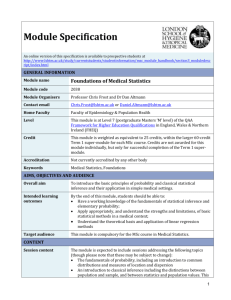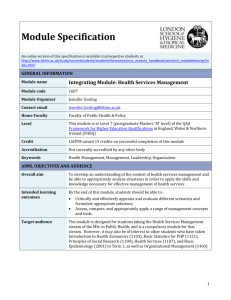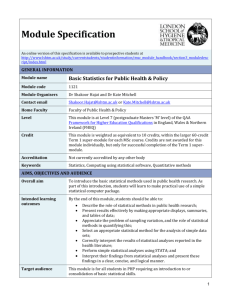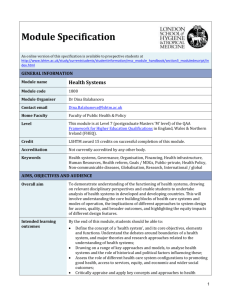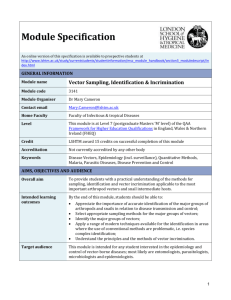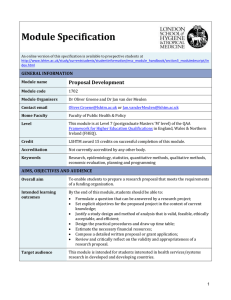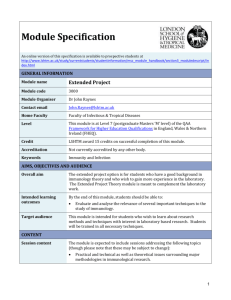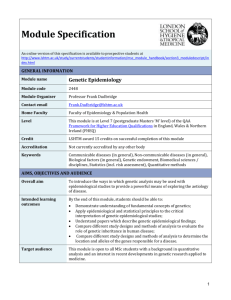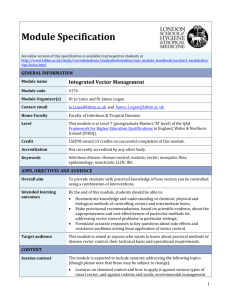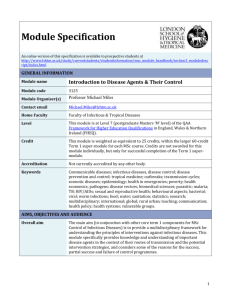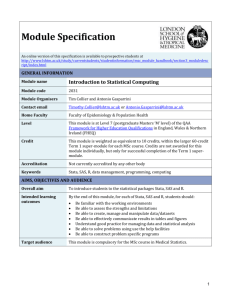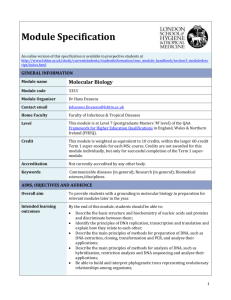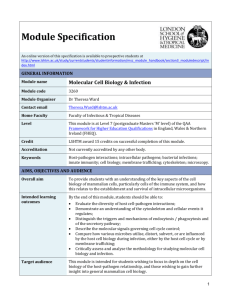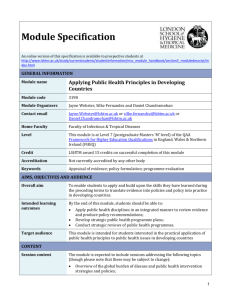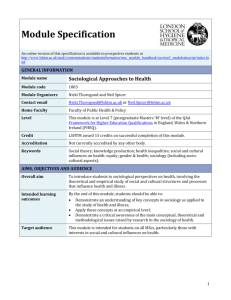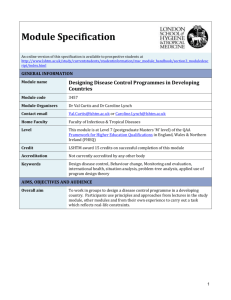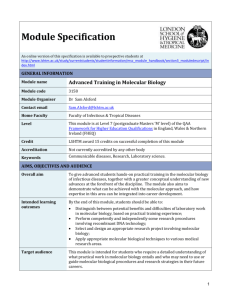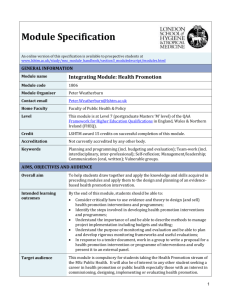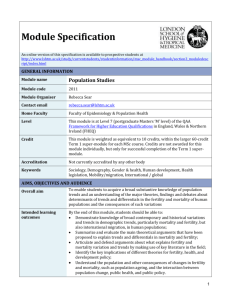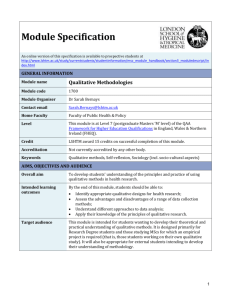3169 Antimicrobial Chemotherapy Module Specification
advertisement
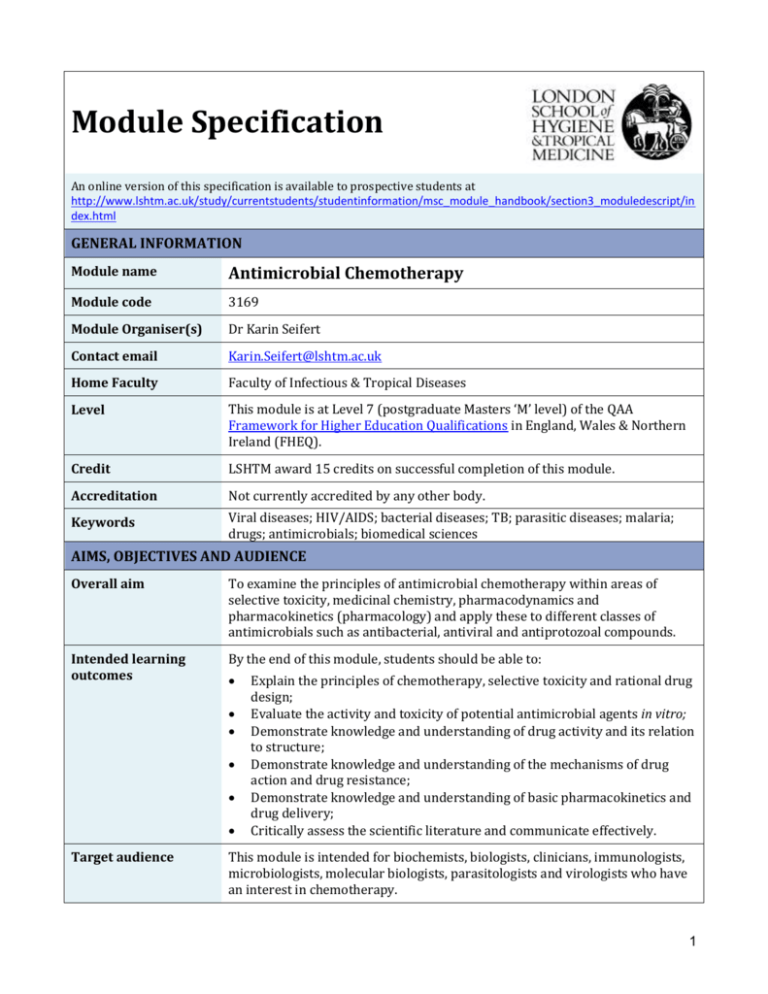
Module Specification An online version of this specification is available to prospective students at http://www.lshtm.ac.uk/study/currentstudents/studentinformation/msc_module_handbook/section3_moduledescript/in dex.html GENERAL INFORMATION Module name Antimicrobial Chemotherapy Module code 3169 Module Organiser(s) Dr Karin Seifert Contact email Karin.Seifert@lshtm.ac.uk Home Faculty Faculty of Infectious & Tropical Diseases Level This module is at Level 7 (postgraduate Masters ‘M’ level) of the QAA Framework for Higher Education Qualifications in England, Wales & Northern Ireland (FHEQ). Credit LSHTM award 15 credits on successful completion of this module. Accreditation Not currently accredited by any other body. Keywords Viral diseases; HIV/AIDS; bacterial diseases; TB; parasitic diseases; malaria; drugs; antimicrobials; biomedical sciences AIMS, OBJECTIVES AND AUDIENCE Overall aim To examine the principles of antimicrobial chemotherapy within areas of selective toxicity, medicinal chemistry, pharmacodynamics and pharmacokinetics (pharmacology) and apply these to different classes of antimicrobials such as antibacterial, antiviral and antiprotozoal compounds. Intended learning outcomes By the end of this module, students should be able to: Target audience Explain the principles of chemotherapy, selective toxicity and rational drug design; Evaluate the activity and toxicity of potential antimicrobial agents in vitro; Demonstrate knowledge and understanding of drug activity and its relation to structure; Demonstrate knowledge and understanding of the mechanisms of drug action and drug resistance; Demonstrate knowledge and understanding of basic pharmacokinetics and drug delivery; Critically assess the scientific literature and communicate effectively. This module is intended for biochemists, biologists, clinicians, immunologists, microbiologists, molecular biologists, parasitologists and virologists who have an interest in chemotherapy. 1 CONTENT Session content The module is expected to include sessions addressing the following topics (though please note that these may be subject to change): Principles of chemotherapy and selective toxicity; Drug targets and mechanisms of drug action; Drug resistance and mechanisms of drug resistance; Methods of drug assays and development; Drug uptake and drug delivery; Analytical methods for pharmacology; Laboratory practicals on drug assays, drug uptake and drug resistance. The drug discovery and drug development process will be addressed within above topics. TEACHING, LEARNING AND ASSESSMENT Study resources provided or required Electronic files accessible via the virtual learning environment, laboratory protocols in hardcopy and as electronic files accessible via the virtual learning environment. Teaching and learning methods A combination of lectures, practicals, tutorials and student presentations. Assessment details Assessment will be based on 1) a short multiple choice paper on the session material and 2) an oral presentation following a scientific question set in a tutorial. The grades for each will be equally weighted and combined to give an overall GPA. For students who are required to re-sit, or granted a deferral or new attempt, the tasks will be 1) a multiple choice questionnaire; and 2) an essay based on a different question to the presentation task. Assessment dates Assessments will take place in the last week of the module. For students who are required to re-sit, or granted a deferral or new attempt, the next assessment date/deadline will be the standard School-recommended date in mid/late September 2016. Language of study and assessment English (please see ‘English language requirements’ below regarding the standard required for entry). TIMING AND MODE OF STUDY Duration The module runs for 5 weeks at 2.5 days per week; this module runs between Wednesday lunchtime and Friday afternoon. 2 Dates For 2015-16, the module will start on Wednesday 20 April 2016 and finish on Friday 20 May 2016. Timetable slot The module runs in LSHTM timetable slot E. Mode of Study The module is taught face-to-face in London. Both full-time and part-time students follow the same schedule. For full-time students, other LSHTM modules are available in the other half of the week for the C and D slots. Learning time The notional learning time for the module totals 150 hours, consisting of: Contact time ≈ 48 hours Directed self-study ≈ 43 hours Self-directed learning ≈ 15 hours Assessment, review and revision ≈ 44 hours. APPLICATION, ADMISSION AND FEES Pre-requisites Knowledge of chemistry and biochemistry would be a benefit. English language requirements A strong command of the English language is necessary to benefit from studying the module. Applicants whose first language is not English or whose prior university studies have not been conducted wholly in English must fulfil LSHTM’s English language requirements, with an acceptable score in an approved test taken in the two years prior to entry. Applicants may be asked to take a test even if the standard conditions have been met. Student numbers Student numbers will be capped at 28 (full participation) due to limitations in facilities. Student selection Equal opportunities will be given to LSHTM MSc students, LSHTM research degree students and external applicants. External applicants may be placed on a waiting list and given priority the next time the module is run. Partial Registration (partial participation) by LSHTM research degree students is allowed for this module. Fees For registered LSHTM MSc students, fees for the module are included within MSc fees (given on individual course prospectus pages). If registering specifically for this module, as a stand-alone short course, individual module fees will apply. Tuition fees must be paid in full before commencing the module, or by any fee deadline set by the Registry. Scholarships Scholarships are not available for individual modules. Some potential sources of funding are detailed on the LSHTM website. 3 Admission deadlines For 2015-16: For registered LSHTM MSc students, the module choice deadline (for Term 2 and 3 modules) is Friday 20 November 2015. If registering specifically for this module, applications may be made at any time but, as places are limited, applications ahead of the MSc deadline are strongly advised. All applications should be submitted at the latest 8 weeks prior to the start of the module. Formal registration will take place on the morning of the first day of the module. ABOUT THIS DOCUMENT This module specification applies for the academic year 2015-16. Last revised: 20 July 2015 by Karin Seifert; Minor amendments 20 July 15 SDB London School of Hygiene & Tropical Medicine, Keppel St., London WC1E 7HT. www.lshtm.ac.uk 4


